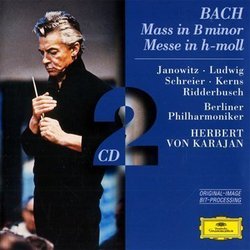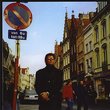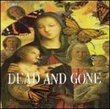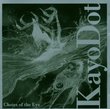| All Artists: Robert Kerns, Johann Sebastian Bach, Herbert von Karajan, Berlin Philharmonic Orchestra, Rudolf Scholz, Gundula Janowitz, Peter Schreier Title: Bach: Mass in B minor Members Wishing: 0 Total Copies: 0 Label: Deutsche Grammophon Release Date: 3/14/2000 Album Type: Original recording remastered Genre: Classical Styles: Opera & Classical Vocal, Historical Periods, Baroque (c.1600-1750), Modern, 20th, & 21st Century Number of Discs: 2 SwapaCD Credits: 2 UPC: 028945946023 |
Search - Robert Kerns, Johann Sebastian Bach, Herbert von Karajan :: Bach: Mass in B minor
 | Robert Kerns, Johann Sebastian Bach, Herbert von Karajan Bach: Mass in B minor Genre: Classical
|
Larger Image |
CD DetailsSimilar CDs
|
CD ReviewsKarajan searching for the inner essence of this mass. Dr. Armando R. Trigueiros | 9760 Praia da Vitória, Azores Portugal | 11/13/2000 (4 out of 5 stars) "Let's observe things with serenety. I quite agree with Emile Swanepoel, but I do not agree with Aaron Mayer and Epauld Olivier. These two reviews are comanded by emotion and are nor scrupolous in using depreciative languange. Karl Richter was the first conductor to avoid romantic exagerations in the perfomance of Bach music; later, the swiss conductor Michel Corboz followed the style of Richter in an interesting equilibrium of baroque style and spirituality. Presently we have the the use of period perfomances, most of them sounds beatifully but, with the small numbers os players and singers we feel the absence of spirituality, meditation or religious joy.(I admire Gardiner reading for his vitality in the joyous parts of the B minor Mass).But Herbert von Karajan condudet this Mass in 1974! In that time, there was not in use the period instruments, neither the new scholl of baroque singing, nor the musicology had discovered what we know today. So, Karajan with his typical effort of touching the deep interiorization of the musical works, does the some in this recording of Bach Mass in B minor. The result is a reading that banishs the romantic reading of Klemperer, the perhaps superficial baroque style of the pioneer Richert, but a very concise performance, specially in the faster and extrovert parts of the mass, where Karajan tempos are not slow. However, in the solo singing, I must admit, the tempi could be a little faster, more lighter. The excelent solo singing are not similar to the recent especialzed baroque singing, but in its context, they are beautifull and in acordance with the time of the recording: 26 years ago! I recomend this recordance for colleters wo like to compare the evolution of perfomance styles. More,I find spirituality in this perfomance, without any exagerated affection. At mid-price its a good achievement. Buy it,witout any fear, however conscious that is not a perios perfomance and its an analogue recording from 1974." Beautiful reading of the b-minor Mass Eměle Swanepoel | Toronto, Canada | 08/14/2000 (4 out of 5 stars) "The chorus may not be faultless but the solo singing is really incredibly beautiful, they make a fine team. Try the "credo"-duet for soprano and alto to see just how beautiful they match. The orchestra is faultless and accompany well. In a sense the chorus give the reading a ruggedness that isn't always inappropriate. Sometimes it makes for very dramatic moments such as the "Donna nobis pacem" which is almost overwhelming in it's intensity and religious feeling. The sound in this new transfer (20 bit reprocessed) is such an improvement over the previous it sounds as if a thick layer of varnish was removed. This helps the solos and duets and also gives the chorus much greater presence. This is a wonderful recording and a wonderful way to get to know this incredible music. Don't be fooled by bad reviews, hear for yourself!" ....most spiritually profound music ever created. DJ Rix | NJ USA | 11/06/2001 (5 out of 5 stars) "Dr. Armando speaks wisely. We have here some of the most spiritually profound music ever created. To impose dogmatic attitudes upon great conductors, their respective musical eras & their interpretations is tantamount to asking if they are Roman Catholic, Lutheran, or Jewish (Bach was Lutheran). Great recordings co-exist; they do not supercede or negate each other. In this kind of music, I want conductors to express what is in their hearts."
|

 Track Listings (12) - Disc #1
Track Listings (12) - Disc #1



